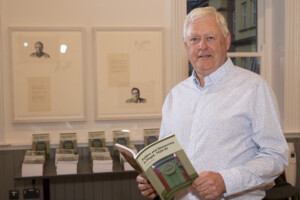The bitter legacy of the Civil War, fierce rivalries between local and national leaders, and the struggle to shape a young Irish state, all of it played out in north County Dublin.
Now, that dramatic and often overlooked history is being retold in a groundbreaking new publication.
Politics and Democracy in Fingal, 1924–39, written by historian Dr Declan Brady and published by Fingal Libraries, is the first instalment of a six-part series that will chart more than two centuries of political life in Fingal.
It explores the turbulent years following the establishment of the Irish Free State, when local politicians fought to maintain their influence against the pull of national politics and centralised government.
The book delves into a period marked by deep scars left from the Civil War of 1922–23, when neighbours and even families were divided by opposing loyalties.
These divisions continued to shape political life throughout the 1920s and 1930s, often spilling into animosity within Fingal itself.
But as Dr Brady’s research shows, politics in the region was about far more than ideological divisions.
Issues such as poverty, land ownership and inequality remained at the forefront of debate, ensuring that Fingal’s political stage reflected both local struggles and national tensions.

Photo by Kevin McFeely for Coalesce
“This is not just a history of politics,” Dr Brady (pictured above) said at the launch, “it is a history of Fingal itself — its people, its communities, and its place in the broader Irish story.”
The official launch of Politics and Democracy in Fingal, 1924–39 took place in The Carnegie Library.
The event was attended by Mayor of Fingal, Cllr Tom O’Leary, who welcomed the publication as a vital contribution to Irish historical scholarship.
“Fingal’s political history is not just a local story, it is part of the wider Irish journey of democracy and self-government,” he said.
“I would like to acknowledge and congratulate Dr Brady, a distinguished historian, educator, and genealogist, whose scholarship and dedication have brought this important history to life.”
The publication is available free of charge across Fingal Library branches and in eBook format through BorrowBox, ensuring wide accessibility for local readers. County Librarian Betty Boardman highlighted this as a key element of the project.
“This publication highlights the richness of our archives while making Fingal’s political history accessible to everyone,” she said.
“We at Fingal Libraries are delighted to provide the book free of charge and I would encourage everyone to read it and to take pride in the history it preserves.”
The research was supported by commemorative funding from the Department of Tourism, Culture, Arts, Gaeltacht, Sport, and Media.
In addition to the book itself, Fingal Libraries and Fingal Local Studies & Archives have developed an accompanying exhibition that will travel through the library network in the months ahead.
This exhibition will bring the key themes of the book to life with artefacts, documents, and stories from the period.
AnnMarie Farrelly, Chief Executive of Fingal County Council, said the project underscores the important role of local history in shaping civic awareness today.
“This book gives us a deep understanding of Fingal’s political history and reminds us how deeply local government connects with the everyday lives of our communities. I want to recognise the work of Fingal Local Studies & Archives, who not only collect, preserve, and share our heritage but have made their holdings central to this groundbreaking — and fascinating — series.”
The series of which this volume is the first will eventually stretch back more than 200 years, offering a unique perspective on how democracy has developed in Fingal from the early 19th century to the present day.
Each volume promises to weave national political movements with the local experiences of Fingallians, highlighting how broader historical forces were felt and contested in villages, towns, and communities across the county.
For readers, the significance lies not only in the stories of politicians and policies, but in the way the series connects local identity to Ireland’s national journey.
Fingal’s political life has always carried weight beyond its boundaries, and Dr Brady’s work ensures that legacy will be preserved and understood for generations to come.
As Mayor O’Leary put it at the launch: “This is more than a history book. It is a mirror held up to our past, reminding us where we came from, and perhaps guiding us in where we are going.”